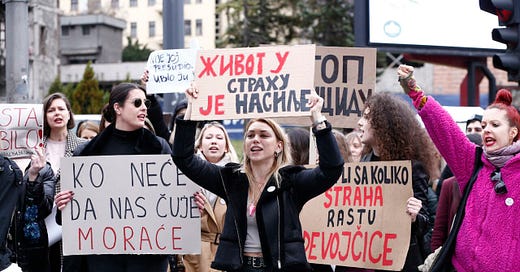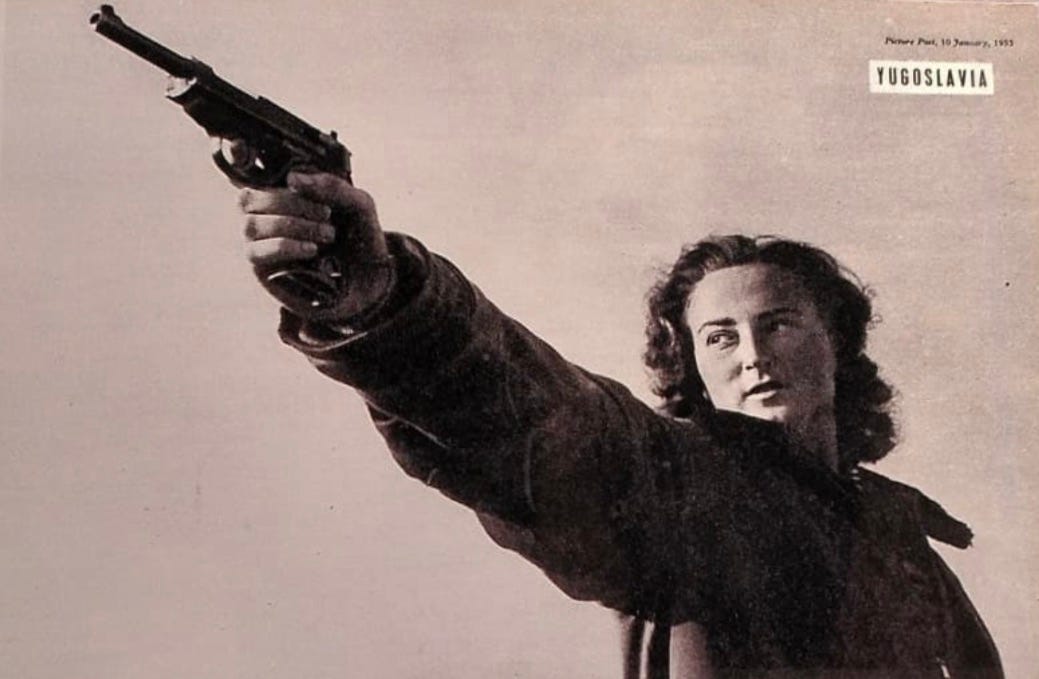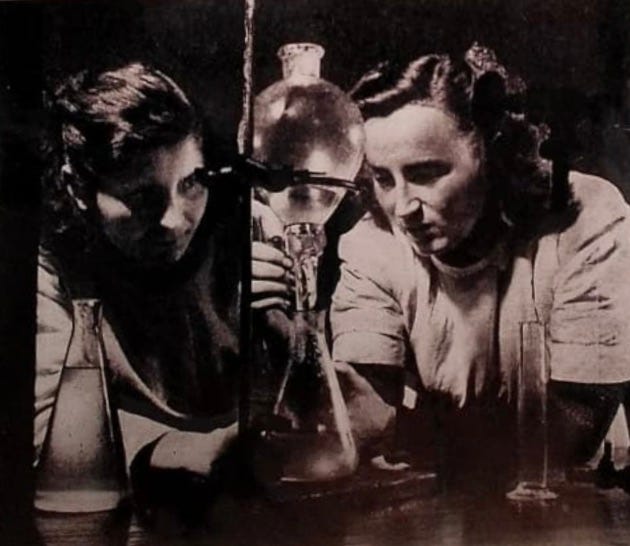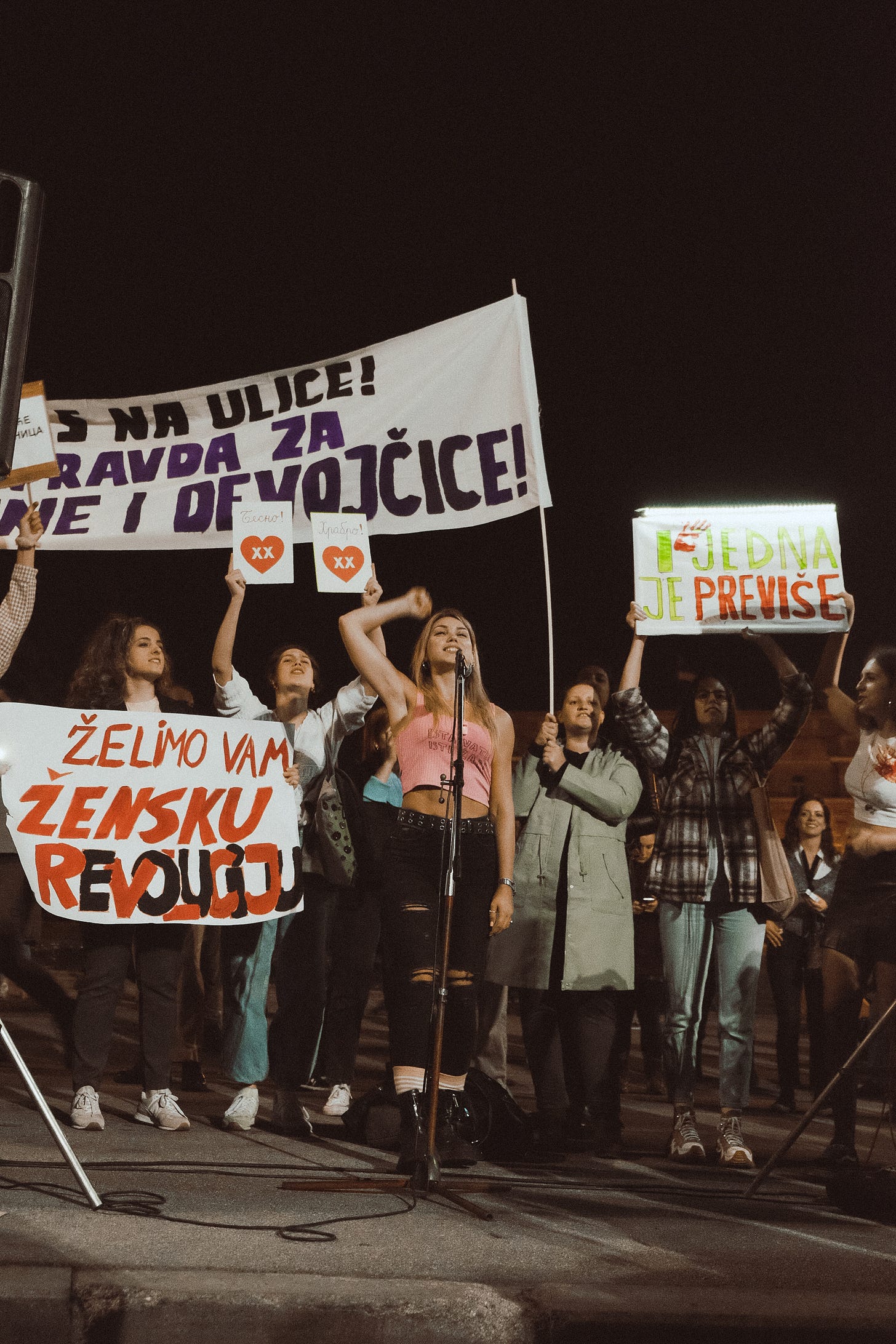S4E15. The feminist fight of Serbian Gen Z
In 1953 Robert Capa portrayed a «realistic, resolute and tenacious» Yugoslav young woman in 'Generation X' report. 70 years later in Belgrade, Jelena Riznić gives voice to a new generational struggle
Dear reader,
welcome back to BarBalkans, the newsletter with blurred boundaries.
It was 1953 when the report Generation X by Robert Capa, one of the greatest photographers of all time, was published in Holiday magazine.
The stories of 23 young men and women from 14 countries around the world coined the concept of ‘Generation X’ for the first time, to describe those 20- to 25-year-olds who had experienced World War II. One of them was Nada Zivkovic, a university student living in Belgrade, the capital of the Socialist Federal Republic of Yugoslavia.
Capa described her as a realistic, resolute, and tenacious young woman. The representation of Generation X in Yugoslavia.
More than 70 years later, there is another generation - born in the late Nineties to the early 2010s - that meets these characteristics, but in a different context. In today’s Belgrade, Ženska solidarnost activist and 26-year-old academic Jelena Riznić has become the emblem of a generational shift.
Realistic, resolute and tenacious. The representation of feminism in Serbian Gen Z, fighting for a future free from the chains of patriarchy.
‘Woman of Purpose’. The Yugoslav Gen X
‘Generation X’
Robert Capa for ‘Holiday’ (January 1953)
“She is strictly a collectivist, who lives the life of a Tito Communist in Belgrade, a life with a positive drive. She is Nada Zivkovic, a state subsidised student in the Technological Faculty of the Higher School of Engineering. She is studying engineering and chemistry because, she says, she wishes to help in the industrialisation of her country.
Her war story is a hard one, but it has not embittered her. At twelve she was carrying food to partisans: was imprisoned, beaten and, after release, fought with the partisans for two years. She is still an officer in the army reserve.
She lives with her parents in a flat shared by her uncle and aunt and their two small children. She has no room of her own and has to study in a small alcove in the kitchen - the only heated room. They have no telephone, but she has a constant correspondence with students in Britain and America.
Most of her student’s allowance is contributed to the household: she has little to spend on clothes. She has many friends, and all are Communists. She says she likes American films, particularly Pearl Buck’s Son of the Dragon, and in the next sentence that she was greatly influenced by Engels and ‘the proponents of dialectical materialism’.
Serious, purposeful, she is the secretary of the Communist Party committee in the Faculty and spends three nights a week on party work. But she is not brittle, or masculine. She does not use cosmetics, but she wears nylons; she practises shooting at the rifle range, but goes to a party or a dance once a week. She has a steady boy friend, hopes to get married and limit her family to two children. More, she feels, would interfere with her work. She was baptised, but practises no religion.
She has definite opinions on world affairs, feels another war in her lifetime is possible, even imminent. The United Nations can be a great force for good if it took more notice of the smaller nations - such as her own. Nada is very typical of the girls of her country: realistic, resolute and tenacious. She definitely belongs to Belgrade-post-war”.
‘Woman of Fight’. The Serbian Gen Z
«If I do not think that things can change, why should I spend my life on it?»
Jelena Riznić, 26-year-old PhD student at the University of Belgrade and activist for Ženska solidarnost (Women’s Solidarity), explains her mission on a personal and academic level in Serbia 70 years later.
She is also a realistic, resolute and tenacious young woman, as it is made clear from her words: «For me feminism is some kind of duty».
The year 2023 for Serbian society was a tough year, with two mass shootings (resulting in 19 deaths, including 10 in an elementary school) and «at least 27 femicides, but everything we know is what reported by media, because the government does not want an official register», Riznić explains.
The cause is crystal clear: «Patriarchy is not just behind femicides but also behind mass shootings, they are connected».
Feminists «have long been warning that when we talk about male violence, when we talk about politics that regulate weapons, we actually talk about patriarchy». And they warned «not only about weapons, but also about the way patriarchy socializes boys and girls differently».
For example, the first shooting on May 3 was carried out by a 13-year-old boy, who learned how to shoot from his father: «It would never happen with a daughter. Also considering that there are so many weapons, we all know that there is a real possibility that something like this can happen».
At the same time, Riznić recalls that «more than half of all femicides were committed by ex-partners, boyfriends, husbands without a permit to possess a weapon», or occurred after a report of violence that was not followed by «any investigation into the risk that they might possess some kind of weapon». Activists, professionals working with women who experienced violence and movements such as Ženska solidarnost warned of this as well.
Read also: XXXIV. This is not just a (video)game
As an activist of Ženska solidarnost since the first day in 2021 - «It was our third anniversary on February 1st» - Riznić highlights the main feature of this informal collective: «For the first time, I realized that we can do things even though we do not have many means, everything is made possible by solidarity of people who donate».
On a political level, «we are something new», but in some kind of continuum with «women’s voices and activism in Serbia, and thanks to the women who came before us». Ženska solidarnost «shows that everyone can do something for a positive change, it can inspire people».
Because the risk of NGO-ization of social movements is «a dispersion of responsibility». This is not a criticism of the civil sector - which «can work miracles» -but a realization that often, when a specific NGO deals with a specific issue, «people may think they have no responsibility to solve problems».
This is where the mission of Serbian Gen Z starts.
Read also: S2E15. A hail of music notes
‘Cracks in patriarchy’. The upcoming generation
During the conversation with BarBalkans, Riznić is keen to mention that «the most important topic for me is definitely violence against girls and women», which she addresses by connecting the two spheres of her life, «as an activist and as a researcher».
And not only gender-based violence, but also «women’s sexuality and the way women's bodies are perceived in patriarchy». This is why the other issues «that are really important to me» are surrogate motherhood, prostitution and pornography: «They are related to feminist theory and they have a great importance in Serbian society».
Combining these two aspects of her life is «some kind of duty», as Riznić feels a need to «give something back to all those women who over the past three years have made me feel so much love, support and protection while fighting my own struggles».
In practical terms, the Serbian researcher and activist is currently working on «connecting scientific methods with new ways to support women who experience violence, to let them know that this is not the end of their lives». As shown by her PhD subject: sexual violence against female students in Belgrade’s faculties. «I think it is really important to describe the violence going on, but more importantly to support the victims».
Read also: XXXVII. Every day is March 8th
Riznić calls herself a «realist» when discussing the collapse of patriarchy: «I do not think I will see it during my life, even though I am only 26 years old». Yet «I can really feel that we will see many different cracks in patriarchy during the next decades».
Despite the fact that «we all live in small bubbles among like-minded people» - and sometimes it is really hard to understand what is happening outside - Riznić points out that «in recent years in Serbia we have seen women raise their voices, even when it was very hard, to talk about violence and sexual violence». Although she does not forget that «every time women raise their voices, patriarchy always finds new ways to adapt the system of oppression».
However, being a «realist» does not mean handling the most difficult issues in a pessimistic way. And «not because I am a strongly optimistic person», Riznić confesses: «But if you are pessimistic about something, why do you do that?»
Even when times are dark, «when I think I am spending my life, my youth and my best energy on something that will not change», everything can suddenly make sense again. Like when she meets girls «who know my fights with Ženska solidarnost and just say “thank you, you are important to me”».
This is why «I choose to continue, even if it is hard». Because this is «the biggest crack in patriarchy, firmly believing that things do change, even though I probably will not see the change during my whole life».
Realistic, resolute and tenacious.
She was Nada Zivkovic of Yugoslav Gen X. She is Jelena Riznić of Serbian Gen Z(enska).
Read also: S3E3. Fighting discrimination out loud
Pit stop. Sittin’ at the BarBalkans
We have reached the end of this piece of road.
In the midst of Serbian Gen Z feminist struggle, we pause just for a while at our bar, the BarBalkans, with our host before starting again our journey.
«I always recommend some homemade rakija», Riznić tells us.
We could not hope for a better recommendation, also considering the unexpected gift we have just received from another recent guest of BarBalkans, the founder of The Balkan Kitchen project, Irina Janakievska.
A bottle of lozova, the grape rakija, infused with redcurrants. All together we can now toast to new fights until the final defeat of nationalism, violence and patriarchy.
Read also: S4E13. Gastronationalism tastes like nothing
Let’s continue BarBalkans journey. We will meet again in two weeks, for the 16th stop of this season.
A big hug and have a good journey!
If you have a proposal for a Balkan-themed article, interview or report, please send it to redazione@barbalcani.eu. External original contributions will be published in the Open Bar section.
The support of readers who every day gives strength to this project - reading and sharing our articles - is also essential to keep BarBalkans newsletter free for everyone.
Behind every original product comes an investment of time, energy and dedication. With your support BarBalkans will be able to elaborate new ideas, interviews and collaborations.
Every second Wednesday of the month you will receive a monthly article-podcast on the Yugoslav Wars, to find out what was happening in the Balkans - right in that month - 30 years ago.
You can listen to the preview of The Yugoslav Wars every month on Spreaker and Spotify.
If you no longer want to receive all BarBalkans newsletters (the biweekly one in English and Italian, Open Bar external contributions, the monthly podcast The Yugoslav Wars for subscribers), you can manage your preferences through Account settings.
There is no need to unsubscribe from all the newsletters, if you think you are receiving too many emails from BarBalkans. Just select the products you prefer!









